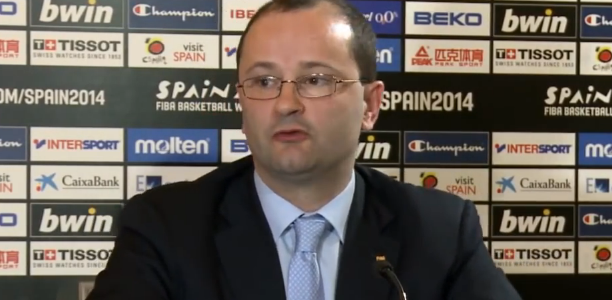Baumann Wants To See Home Nations Unite

FIBA Secretary-General Patrick Baumann has strongly advised that the three national federations of England Basketball, Basketball Scotland and Basketball Wales come together as the British Basketball Federation next year, instead of remaining as three independent bodies.
FIBA awarded both the Great Britain men’s and women’s teams automatic qualification for the London 2012 Olympics last month-on the condition they came to a final decision on the governance structure the home nations want to go with in the long term by June 30th 2012, a decision Baumann feels is a no-brainer;
“If you look at the history books, it stands out that England, Scotland and Wales have participated only a few times in major international basketball competitions – both at senior and junior levels.”
“Since they came together around 2005-2006 and started playing as Great Britain, they have gone from strength to strength, qualifying for EuroBasket tournaments and showing they can compete with some of the best teams.”
“If they disband, it most likely will be a step backwards. They would be going back to the way things were for so many years when they rarely appeared in our competitions.”
Baumann recognises however, it is not his decision to make;
“It is up to the basketball family in Britain to figure out which way they want to go post-Olympic Games,” he argued. “The way they go has to satisfy their ideas but at the same time be in line with the FIBA statutes. This is probably one of the most challenging issues they’re facing.
“Right now the three home nations are members of FIBA and we are very proud to have them. The British Basketball Federation is simply a united federation of those three.”
“I’m pretty sure it’s going to be difficult to continue an exceptional situation where we have three home nations plus a British Basketball Federation. This is quite complex to understand in the international basketball family.”
“They need to figure out what is the best governance to bring the game forward and to take full advantage of having the Olympic Games in your country and take basketball to the next level.”
In the legacy plan it submitted to FIBA, the BBF outlined some of the greater ambitions it had for post-2012.
One is bidding to host the 2015 or 2017 EuroBasket Men event in Great Britain.
Another is coming to an agreement with England Basketball and the other home country boards to raise the standard of play in the British Basketball League, which will be beneficial both for the growth of players as well as from a marketing standpoint.
There is also mention of further development of club basketball for women.
All of these ideas look good on paper, but the BBF and the home nations must now figure the best way to turn these ideas into concrete realities. And Baumann is particularly insistent on the issue of having a domestic league of a certain calibre.
“The competitiveness of the British Basketball League is another part of a challenging issue for the British Basketball family. It is proven recipe that a good national team that performs well at the international level serves as an engine for development and increasing the popularity of the game. But that then needs to be supported by a domestic competition that, in itself, is also very popular or at least becomes popular and in turn gives the next boost to the national team.
“They go hand in hand. If they don’t go hand in hand, the chances for growing the game of basketball – and this is typical also in other team sports – aren’t good.”
“Therefore I think that the British Basketball League needs somehow to support whatever strategy is put forward by the British basketball family and adjust whatever is needed in order to get competitive.”
“For many years, the Euroleague and FIBA Europe have looked to have British clubs that participate regularly at the international club competition level. Regrettably, that is not yet a given or something that happens on a regular basis and therefore does not allow for a regular comparison between the British clubs and clubs in the rest of Europe.”
If, after extensive consultation, the BFF and the three national federations decide it is in their best interest to go their separate ways, the exceptional status granted to the BBF will cease to exist right after the 2012 Olympic Games.
The exceptional status enabled Great Britain to participate in FIBA competitions in recent years, despite the fact that it is not a member federation.
Baumann’s feeling that England, Scotland and Wales should come together for good as the British Basketball Federation is supported by some of the main findings from British Basketball’s Stakeholder’s Survey.
In the survey carried out in August 2010, 84.5 per cent of respondents said Great Britain should continue to compete in major competitions (FIBA World Championships, Olympic Games, European Championships) after 2012. They do ask for a special dispensation for Scotland and Wales to compete in a different division (B or C) than Great Britain in the European Championships.
Also, 82.5 per cent disagreed with the notion that Great Britain international teams (England, Scotland, Wales) should compete at Olympic level only with the home country teams able to compete at World and European levels.
Baumann believes having a united federation will have positive repercussions across the board.
“If you want to have a proper legacy plan for the future of basketball in a country, all basketball stakeholders need to be united and absolutely agree on the way forward.”
Thoughts? What would you like to see happen? Drop a comment and let us know!





6 Comments